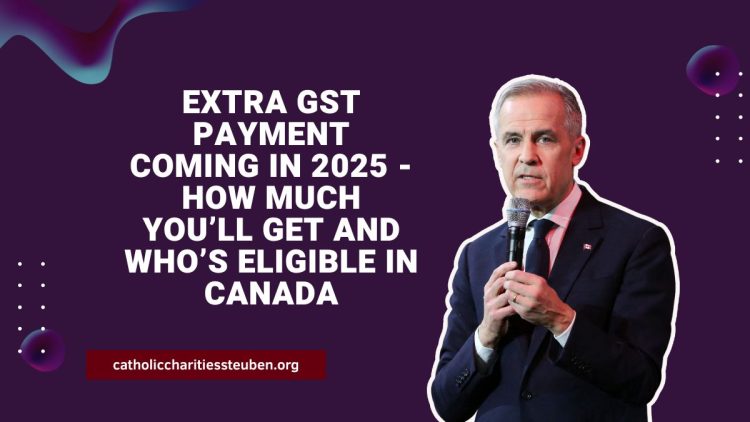The Canadian government has announced an extra Goods and Services Tax (GST) payment in 2025 to provide relief for households affected by rising living expenses.
This one-time financial boost is part of broader efforts to support low and modest-income individuals and families.
Here’s everything you need to know about how much you’ll get, who qualifies, and when to expect the payment.
What Is the GST/HST Credit?
The GST/HST credit is a tax-free quarterly payment provided to eligible Canadians to help offset the taxes paid on goods and services. It is designed specifically for individuals and families with low to moderate incomes, and payments are issued every three months.
The amount you receive depends on your:
- Adjusted Family Net Income (AFNI)
- Marital status
- Number of dependent children under 19
Extra GST Payment for 2025: What’s New?
In addition to the regular quarterly GST payments, a one-time extra payment will be issued in 2025 to provide further financial assistance. This special benefit is aimed at helping Canadians deal with the increasing cost of essential goods and services.
Who Is Eligible for the Extra GST Payment in 2025?
To be eligible for the 2025 extra GST credit, you must:
- Be a Canadian resident for tax purposes
- Be 19 years or older
- Have filed your 2023 income tax return
- Meet the income requirements
Individuals who have children under the age of 19 and are primary caregivers may receive a higher amount, but the payment is generally issued once per household.
How Much Will You Get?
The extra GST credit amount will depend on your family situation and income. Here is a general breakdown of the maximum extra payment amounts for 2025:
| Category | Maximum Extra Payment |
|---|---|
| Single Individual | $250 |
| Married/Common-Law Couple | $250 |
| Family with Children | $250 |
This payment is non-taxable and will not affect your eligibility for any other federal or provincial programs.
When Will the Extra GST Payment Arrive?
The extra GST payment is expected to be issued in March 2025, separate from the regular quarterly credit. For planning purposes, here’s a look at the full GST payment schedule for 2025:
| Quarter | Payment Date |
|---|---|
| Q1 | January 3, 2025 |
| Extra Payment | March 2025 |
| Q2 | April 4, 2025 |
| Q3 | July 4, 2025 |
| Q4 | October 3, 2025 |
Those enrolled in direct deposit will receive the funds faster than those receiving mailed cheques.
How to Receive the Extra GST Payment
If you’re already receiving the GST/HST credit, there’s nothing more you need to do. As long as your 2023 tax return is filed and your information is up to date, you’ll automatically receive the one-time extra payment.
Newcomers to Canada or those who recently became eligible for the GST credit should ensure they complete the necessary application forms and register with the CRA to receive the benefit.
Additional Provincial/Territorial Benefits
In addition to the federal extra GST payment, some provinces offer their own supplemental tax credits and rebates. These are often included with your GST/HST credit payment and may vary based on where you live.
For example:
- Ontario provides the Ontario Sales Tax Credit
- British Columbia offers the BC Climate Action Tax Credit
- Alberta administers the Alberta Child and Family Benefit
These extra benefits can provide further financial support in addition to the one-time GST boost.
The extra GST payment in 2025 will provide much-needed relief for millions of Canadians during a time of increased economic pressure.
Whether you’re a single individual, part of a couple, or raising children, this one-time benefit can help ease the burden of everyday costs.
Ensure your tax return is filed and your personal information is current so you can receive this valuable support without delay.
FAQs
Do I need to apply for the extra GST payment in 2025?
No. If you’ve filed your 2023 tax return and meet the eligibility criteria, you will automatically receive the payment.
Will the extra GST payment affect my tax return or other benefits?
No. This is a non-taxable benefit and does not impact any other government programs or tax filings.
What if I recently moved or changed bank accounts?
Make sure your mailing address and direct deposit information are updated with the CRA to avoid delays or missed payments.
